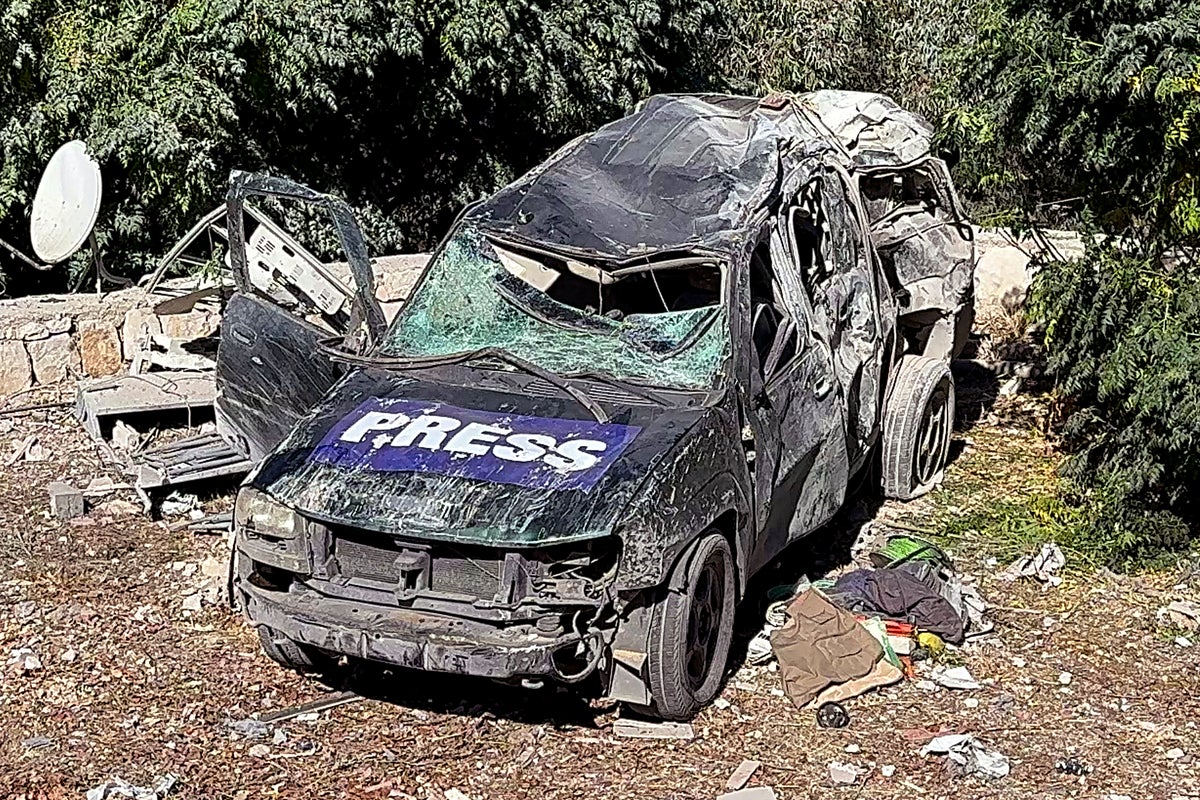
An Israeli strike killed 38 people in Khan Younis, Gaza’s health ministry has said, and three journalists in southern Lebanon, as Israel’s military continues to ramp up its offensives.
International pressure pushing for a ceasefire and for Israel to allow more humanitarian aid into the Gaza strip, particularly its northern half, have not stopped the Israeli army from pressing on.
The deaths reported by Gaza health officials were the latest in the southern city of Khan Younis on Thursday, where people have in recent days lined up for bread outside the city’s only bakery in operation. They come a day after United States Secretary of State Antony Blinken said that Israel had accomplished its objective of “effectively dismantling” Hamas, and implored both sides to revive negotiations.
On Friday, an Israeli airstrike on guesthouses in southeast Lebanon killed three journalists, while Mr Blinken also called for a diplomatic solution to the conflict there.
In northern Gaza, where an area around the town of Jabalia has been the target of a weeks-long offensive, health officials said Israeli forces stormed Kamal Adwan Hospital, one of three medical facilities struggling to operate there, and stationed forces outside it. The Israeli military said it was operating in the area of Kamal Adwan Hospital based on intelligence “regarding the presence of terrorists and terrorist infrastructure” there.
Meanwhile, Israeli strikes on three houses in the nearby Gaza town of Beit Lahiya killed 25 people and wounded dozens more, medics said. Later on Friday, an Israeli airstrike killed nine people in Shati camp in Gaza City, medics said, raising the number of Palestinians killed by Israeli fire across the enclave to at least 72 since Thursday night.

Hezbollah and Israel started trading near-daily fire across the Lebanon-Israel in the wake of Israel launching its war in Gaza in retaliation for the 7 October attack on Israel by Hamas, in which around 1,200 people were killed and 251 taken hostage. Israel’s retaliatory air and ground assault in Gaza has killed more than 42,000 people, according to the health ministry in Gaza, and has led to more than 90 per cent of the territory’s population being displaced.
Israel launched its major offensive in Lebanon – airstrikes followed up with a ground invasion – a month ago, saying it was targeting the heavily armed, Iran-backed Hezbollah to secure the return home of tens of thousands of Israelis evacuated from the north due to cross-border rocket attacks. Beirut authorities say Israel’s Lebanon offensive has killed more than 2,500 people and displaced more than 1.2 million people, sparking a humanitarian crisis.
The journalists killed in south Lebanon in Friday’s strike were camera operator Ghassan Najjar and engineer Mohamed Reda of the pro-Iranian news outlet Al-Mayadeen and camera operator Wissam Qassem, who worked for Hezbollah’s Al-Manar, the outlets said in separate statements. Several others were wounded.
They had been staying at guesthouses in Hasbaya when it was hit around 3am local time. The town had not previously been targeted.

Five journalists have been killed in previous Israeli strikes while reporting on the conflict, including Reuters visual journalist Issam Abdallah on October 13, 2023.
“This is a war crime,” Lebanese Information Minister Ziad Makary said. The Israeli military did not immediately comment on the strike, but denies targeting journalists.
Imran Khan, a senior correspondent for Al Jazeera English, who was among the journalists in the Hasbaya Village Club guesthouses, said the airstrike hit at around 3:30am without warning.
“These were just journalists that were sleeping in bed after long days of covering the conflict,” he posted on social media, adding that he and his team were unhurt.

Many journalists had been staying in the Hasbaya region as it had avoided much of the violence seen in other regions along the border. Lebanon’s Health Minister said on Friday that 11 journalists have been killed and eight wounded since exchange of fire began along the Lebanon-Israel border in early October 2023. In November 2023, two journalists for Al-Mayadeen TV were killed in a drone strike. A month earlier, Israeli shelling in southern Lebanon killed Reuters videographer Issam Abdallah and wounded other journalists from France’s international news agency, Agence France-Presse, and Qatar’s Al Jazeera TV.
Israel has accused journalists working for Al Jazeera of being members of militant groups, citing documents it purportedly found in Gaza. The network has denied the claims as “a blatant attempt to silence the few remaining journalists in the region”. The Committee to Protect Journalists (CPJ) has dismissed them as well, and said, “Israel has repeatedly made similar unproven claims without producing credible evidence.”
A preliminary count shows that at least 128 journalists have also been killed in Gaza since the war began, the CPJ said on Thursday.
Mr Blinken said there is a “real sense of urgency” to reach a diplomatic resolution to produce a “real security along border between Israel and Lebanon”.
Speaking in London on Friday, he added it was important that “people at both sides of the border can have the confidence to be able to return to their homes”.
Meanwhile, World Health Organisation (WHO) spokesperson Christian Lindmeier said on Friday that at the current rate, it would take seven years to evacuate the 2,500 Palestinian children who need urgent medical evacuation, adding that children are dying. It came as the WHO’s representative in the West Bank and Gaza, Dr Rik Peeperkorn, announced that 450,000 children have now received the Polio vaccine.







